- Home
- Dave Eggers
The Circle Page 3
The Circle Read online
Page 3
And Ty had come upon all this more or less by accident. He was tired of remembering identities, entering passwords and his credit-card information, so he designed code to simplify it all. Did he purposely use the letters of his name in TruYou? He said he realized only afterward the connection. Did he have any idea of the commercial implications of TruYou? He claimed he did not, and most people assumed this was the case, that the monetization of Ty’s innovations came from the other two Wise Men, those with the experience and business acumen to make it happen. It was they who monetized TruYou, who found ways to reap funds from all of Ty’s innovations, and it was they who grew the company into the force that subsumed Facebook, Twitter, Google, and finally Alacrity, Zoopa, Jefe, and Quan.
“Tom doesn’t look so good here,” Annie noted. “He’s not quite that sharky. But I hear he loves this picture.”
To the lower left of Ty was Tom Stenton, the world-striding CEO and self-described Capitalist Prime—he loved the Transformers—wearing an Italian suit and grinning like the wolf that ate Little Red Riding Hood’s grandmother. His hair was dark, at the temples striped in grey, his eyes flat, unreadable. He was more in the mold of the eighties Wall Street traders, unabashed about being wealthy, about being single and aggressive and possibly dangerous. He was a free-spending global titan in his early fifties who seemed stronger every year, who threw his money and influence around without fear. He was unafraid of presidents. He was not daunted by lawsuits from the European Union or threats from state-sponsored Chinese hackers. Nothing was worrisome, nothing was unattainable, nothing was beyond his pay grade. He owned a NASCAR team, a racing yacht or two, piloted his own plane. He was the anachronism at the Circle, the flashy CEO, and created conflicted feelings among many of the utopian young Circlers.
His kind of conspicuous consumption was notably absent from the lives of the other two Wise Men. Ty rented a ramshackle two-bedroom apartment a few miles away, but then again, no one had ever seen him arrive at or leave campus; the assumption was that he lived there. And everyone knew where Eamon Bailey lived—a highly visible, profoundly modest three-bedroom home on a widely accessible street ten minutes from campus. But Stenton had houses everywhere—New York, Dubai, Jackson Hole. A floor atop the Millennium Tower in San Francisco. An island near Martinique.
Eamon Bailey, standing next to him in the painting, seemed utterly at peace, joyful even, in the presence of these men, both of whom were, at least superficially, diametrically opposed to his values. His portrait, to the lower right of Ty’s, showed him as he was—grey-haired, ruddy-faced, twinkly-eyed, happy and earnest. He was the public face of the company, the personality everyone associated with the Circle. When he smiled, which was near-constantly, his mouth smiled, his eyes smiled, his shoulders even seemed to smile. He was wry. He was funny. He had a way of speaking that was both lyrical and grounded, giving his audiences wonderful turns of phrase one moment and plainspoken common sense the next. He had come from Omaha, from an exceedingly normal family of six, and had more or less nothing remarkable in his past. He’d gone to Notre Dame and married his girlfriend, who’d gone to Saint Mary’s down the road, and now they had four children of their own, three girls and finally a boy, though that boy had been born with cerebral palsy. “He’s been touched,” Bailey had put it, announcing the birth to the company and the world. “So we’ll love him even more.”
Of the Three Wise Men, Bailey was the most likely to be seen on campus, to play Dixieland trombone in the company talent show, most likely to appear on talk shows representing the Circle, chuckling when talking about—when shrugging off—this or that FCC investigation, or when unveiling a helpful new feature or game-changing technology. He preferred to be called Uncle Eamon, and when he strode through campus, he did so as would a beloved uncle, accessible and genuine. “Like Bill Murray striding through Pebble Beach,” was how Stenton once described him. “Loved by all, and I think he really loves them back.” The three of them, in life and in this portrait, made for a strange bouquet of mismatched flowers, but there was no doubt that it worked. Everyone knew it worked, the three-headed model of management, and the dynamic was thereafter emulated elsewhere in the Fortune 500, with mixed results.
“But so why,” Mae asked, “couldn’t they afford a real portrait by someone who knows what they’re doing?”
The more she looked at it, the stranger it became. The artist had arranged it such that each of the Wise Men had placed a hand on another’s shoulder. It made no sense and defied the way arms could bend or stretch.
“Bailey thinks it’s hilarious,” Annie said. “He wanted it in the main hallway, but Stenton vetoed him. You know Bailey’s a collector and all that, right? He’s got incredible taste. I mean, he comes across as the good-time guy, as the everyman from Omaha, but he’s a connoisseur, too, and is pretty obsessed with preserving the past—even the bad art of the past. Wait till you see his library.”
They arrived at an enormous door, which seemed and likely was medieval, something that would have kept barbarians at bay. A pair of giant gargoyle knockers protruded at chest level, and Mae went for the easy gag.
“Nice knockers.”
Annie snorted, waved her hand over a blue pad on the wall, and the door opened.
Annie turned to her. “Holy fuck, right?”
It was a three-story library, three levels built around an open atrium, everything fashioned in wood and copper and silver, a symphony of muted color. There were easily ten thousand books, most of them bound in leather, arranged tidily on shelves gleaming with lacquer. Between the books stood stern busts of notable humans, Greeks and Romans, Jefferson and Joan of Arc and MLK. A model of the Spruce Goose—or was it the Enola Gay?—hung from the ceiling. There were a dozen or so antique globes lit from within, the light buttery and soft, warming various lost nations.
“He bought so much of this stuff when it was about to be auctioned off, or lost. That’s his crusade, you know. He goes to these distressed estates, these people who are about to have to sell their treasures at some terrible loss, and he pays market rates for all this, gives the original owners unlimited access to the stuff he’s bought. That’s who’s here a lot, these grey-hairs who come in to read or touch their stuff. Oh you have to see this. It’ll blow your head off.”
Annie led Mae up the three flights of stairs, all of them tiled with intricate mosaics—reproductions, Mae assumed, of something from the Byzantine era. She held the brass rail going up, noting the lack of fingerprints, of any blemish whatsoever. She saw accountants’ green reading lamps, telescopes crisscrossed and gleaming in copper and gold, pointing out the many beveled-glass windows—“Oh look up,” Annie told her, and she did, to find the ceiling was stained glass, a fevered rendering of countless angels arranged in rings. “That’s from some church in Rome.”
They arrived at the library’s top floor, and Annie led Mae through narrow corridors of round-spined books, some of them as tall as her—Bibles and atlases, illustrated histories of wars and upheavals, long-gone nations and peoples.
“All right. Check this out,” Annie said. “Wait. Before I show you this, you have to give me a verbal non-disclosure agreement, okay?”
“Fine.”
“Seriously.”
“I’m serious. I take this seriously.”
“Good. Now when I move this book …” Annie said, removing a large volume titled The Best Years of Our Lives. “Watch this,” she said, and backed up. Slowly, the wall, bearing a hundred books, began to move inward, revealing a secret chamber within. “That’s High Nerd, right?” Annie said, and they walked through. Inside, the room was round and lined with books, but the main focus was a hole in the middle of the floor, surrounded by a copper barrier; a pole extended down, through the floor and to unknown regions below.
“Does he fight fires?” Mae asked.
“Hell if I know,” Annie said.
“Where does it go?”
“As far as I can tell, it goes to Bailey’s parking s
pace.”
Mae mustered no adjectives. “You ever go down?”
“Nah, even showing me this was a risk. He shouldn’t have. He told me that. And now I’m showing you, which is silly. But it shows you the kind of mind this guy has. He can have anything, and what he wants is a fireman’s pole that drops seven stories to the garage.”
The sound of a droplet emitted from Annie’s earpiece, and she said “Okay” to whomever was on the other end. It was time to go.
“So,” Annie said in the elevator—they were dropping back to the main staff floors—“I have to go and do some work. It’s plankton-inspection time.”
“It’s what time?” Mae asked.
“You know, little startups hoping the big whale—that’s us—will find them tasty enough to eat. Once a week we take a series of meetings with these guys, Ty-wannabes, and they try to convince us that we need to acquire them. It’s a little bit sad, given they don’t even pretend to have any revenue, or even potential for it, anymore. Listen, though, I’m going to hand you off to two company ambassadors. They’re both very serious about their jobs. Actually, beware of just how into their jobs they are. They’ll give you a tour of the rest of the campus, and I’ll pick you up for the solstice party afterward, okay? Starts at seven.”
The doors opened on the second floor, near the Glass Eatery, and Annie introduced her to Denise and Josiah, both in their late-middle-twenties, both with the same level-eyed sincerity, both wearing simple button-down shirts in tasteful colors. Each shook Mae’s hand in two of theirs, and almost seemed to bow.
“Make sure she doesn’t work today,” were Annie’s last words before she disappeared back into the elevator.
Josiah, a thin and heavily freckled man, turned his blue unblinking eyes to Mae. “We’re so glad to meet you.”
Denise, tall, slim, Asian-American, smiled at Mae and closed her eyes, as if savoring the moment. “Annie told us all about you two, how far back you go. Annie’s the heart and soul of this place, so we’re very lucky to have you here.”
“Everyone loves Annie,” Josiah added.
Their deference to Mae felt awkward. They were surely older than her, but they behaved as if she were a visiting eminence.
“So I know some of this might be redundant,” Josiah said, “but if it’s okay we’d like to give you the full newcomer tour. Would that be okay? We promise not to make it lame.”
Mae laughed, urged them on, and followed.
The rest of the day was a blur of glass rooms and brief, impossibly warm introductions. Everyone she met was busy, just short of overworked, but nevertheless thrilled to meet her, so happy she was there, any friend of Annie’s … There was a tour of the health center, and an introduction to the dreadlocked Dr. Hampton who ran it. There was a tour of the emergency clinic and the Scottish nurse who did the admitting. A tour of the organic gardens, a hundred yards square, where there were two full-time farmers giving a talk to a large group of Circlers while they sampled the latest harvest of carrots and tomatoes and kale. There was a tour of the mini-golf area, the movie theater, the bowling alleys, the grocery store. Finally, deep in what Mae assumed was the corner of the campus—she could see the fence beyond, the rooftops of San Vincenzo hotels where visitors to the Circle stayed—they toured the company dorms. Mae had heard something about them, Annie mentioning that sometimes she crashed on campus and now preferred those rooms to her own home. Walking through the hallways, seeing the tidy rooms, each with a shiny kitchenette, a desk, an overstuffed couch and bed, Mae had to agree that the appeal was visceral.
“There are 180 rooms now, but we’re growing quickly,” Josiah said. “With ten thousand or so people on campus, there’s always a percentage of people who work late, or just need a nap during the day. These rooms are always free, always clean—you just have to check online to see which ones are available. Right now they book up fast, but the plan is to have at least a few thousand rooms within the next few years.”
“And after a party like tonight’s, these are always full,” Denise said, with what she meant to be a conspiratorial wink.
The tour continued through the afternoon, with stops to sample food at the culinary class, taught that day by a celebrated young chef known for using the whole of any animal. She presented Mae with a dish called roasted pigface, which Mae ate and discovered tasted like a more fatty bacon; she liked it very much. They passed other visitors as they toured the campus, groups of college students, and packs of vendors, and what appeared to be a senator and his handlers. They passed an arcade stocked with vintage pinball machines and an indoor badminton court, where, Annie said, a former world champion was kept on retainer. By the time Josiah and Denise had brought her back around to the center of the campus, the light was dimming, and staffers were installing tiki torches in the grass and lighting them. A few thousand Circlers began to gather in the twilight, and standing among them, Mae knew that she never wanted to work—never wanted to be—anywhere else. Her hometown, and the rest of California, the rest of America, seemed like some chaotic mess in the developing world. Outside the walls of the Circle, all was noise and struggle, failure and filth. But here, all had been perfected. The best people had made the best systems and the best systems had reaped funds, unlimited funds, that made possible this, the best place to work. And it was natural that it was so, Mae thought. Who else but utopians could make utopia?
“This party? This is nothing,” Annie assured Mae, as they shuffled down the forty-foot buffet. It was dark now, the night air cooling, but the campus was inexplicably warm, and illuminated by hundreds of torches bursting with amber light. “This one’s Bailey’s idea. Not like he’s some Earth Mother, but he gets into the stars, the seasons, so the solstice stuff is his. He’ll appear at some point and welcome everyone—usually he does at least. Last year he was in some kind of tanktop. He’s very proud of his arms.”
Mae and Annie were on the lush lawn, loading their plates and then finding seats in the stone amphitheater built into a high grassy berm. Annie was refilling Mae’s glass from a bottle of Riesling that, she said, was made on campus, some kind of new concoction that had fewer calories and more alcohol. Mae looked across the lawn, at the hissing torches arrayed in rows, each row leading revelers to various activities—limbo, kickball, the Electric Slide—none of them related in any way to the solstice. The seeming randomness, the lack of any enforced schedule, made for a party that set low expectations and far exceeded them. Everyone was quickly blitzed, and soon Mae lost Annie, and then got lost entirely, eventually finding her way to the bocce courts, which were being used by a small group of older Circlers, all of them at least thirty, to roll cantaloupes into bowling pins. She made her way back to the lawn, where she joined a game the Circlers were calling “Ha,” which seemed to involve nothing more than lying down, with legs or arms or both overlapping. Whenever the person next to you said “Ha” you had to say it, too. It was a terrible game, but for the time being, Mae needed it, because her head was spinning, and she felt better horizontal.
“Look at this one. She looks so peaceful.” It was a voice close by. Mae realized the voice, a man’s, was referring to her, and she opened her eyes. She saw no one above her. Only sky, which was mostly clear, with wisps of grey clouds moving swiftly across the campus and heading out to sea. Mae’s eyes felt heavy, and she knew it was not late, not past ten anyway, and she didn’t want to do what she often did, which was fall asleep after two or three drinks, so she got up and went looking for Annie or more Riesling or both. She found the buffet, and found it in shambles, a feast raided by animals or Vikings, and made her way to the nearest bar, which was out of Riesling and was now offering only some kind of vodka-and-energy drink concoction. She moved on, asking random passersby about Riesling, until she felt a shadow pass before her.
“There’s more over here,” the shadow said.
Mae turned to find a pair of glasses reflecting blue, sitting atop the vague shape of a man. He turned to walk away.
“Not yet. You’re standing still. But you should if you want more of that wine.”
She followed the shadow across the lawn and under a canopy of high trees, the moonlight shooting through, a hundred silver spears. Now Mae could see the shadow better—he was wearing a sand-colored T-shirt and some kind of vest, leather or suede, over it—a combination Mae hadn’t seen in some time. Then he stopped and was crouching down near the bottom of a waterfall, a manmade waterfall coming down the side of the Industrial Revolution.
“I hid a few bottles here,” he said, his hands deep in the pool that received the falling water. Not finding anything, he kneeled down, his arms submerged to the shoulder, until he retrieved two sleek green bottles, stood up and turned to her. Finally she got a good look at him. His face was a soft triangle, concluding in a chin so subtly dimpled she hadn’t seen it before that moment. He had the skin of a child, the eyes of a much older man and a prominent nose, crooked and bent but somehow giving stability to the rest of his face, like the keel of a yacht. His eyebrows were heavy dashes rushing away, toward his ears, which were rounded, large, princess-pink. “You want to go back to the game or …?” He seemed to be implying that the “or” could be far better.
“Sure,” she said, realizing that she didn’t know this person, knew nothing about him. But because he had those bottles, and because she’d lost Annie, and because she trusted everyone within these Circle walls—she had at that moment so much love for everyone within those walls, where everything was new and everything allowed—she followed him back to the party, to the outskirts of it anyway, where they sat on a high ring of steps overlooking the lawn, and watched the silhouettes run and squeal and fall below.

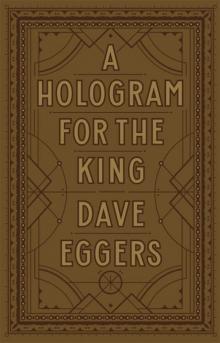 A Hologram for the King
A Hologram for the King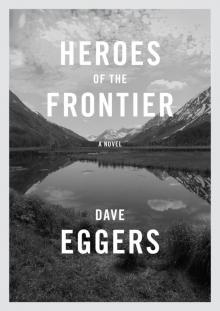 Heroes of the Frontier
Heroes of the Frontier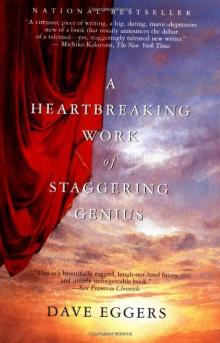 A Heartbreaking Work of Staggering Genius
A Heartbreaking Work of Staggering Genius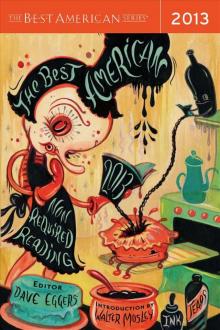 The Best American Nonrequired Reading 2013
The Best American Nonrequired Reading 2013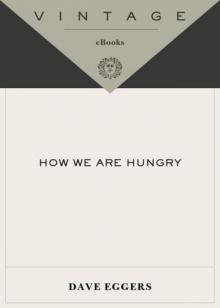 How We Are Hungry
How We Are Hungry The Circle
The Circle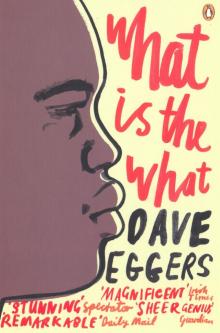 What is the What
What is the What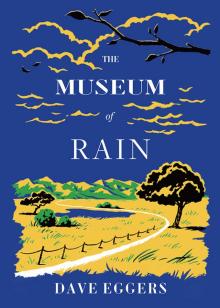 The Museum of Rain
The Museum of Rain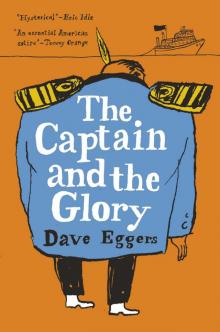 The Captain and the Glory
The Captain and the Glory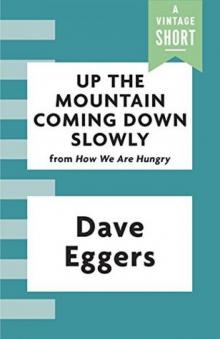 Up the Mountain Coming Down Slowly
Up the Mountain Coming Down Slowly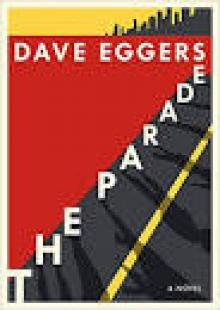 The Parade
The Parade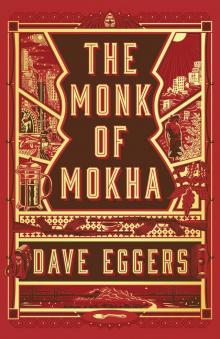 The Monk of Mokha
The Monk of Mokha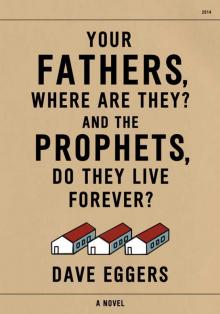 Your Fathers, Where Are They? And the Prophets, Do They Live Forever?
Your Fathers, Where Are They? And the Prophets, Do They Live Forever?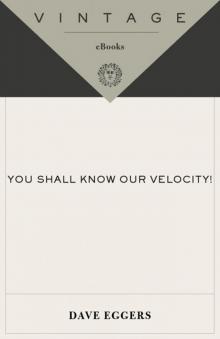 You Shall Know Our Velocity
You Shall Know Our Velocity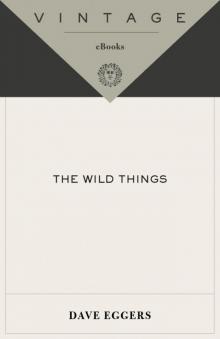 The Wild Things
The Wild Things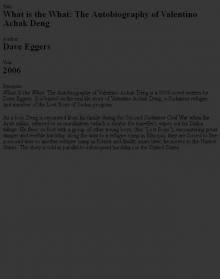 2006 - What is the What
2006 - What is the What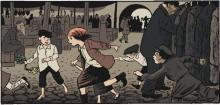 The Best American Nonrequired Reading 2011
The Best American Nonrequired Reading 2011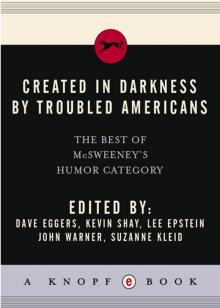 Created in Darkness by Troubled Americans
Created in Darkness by Troubled Americans